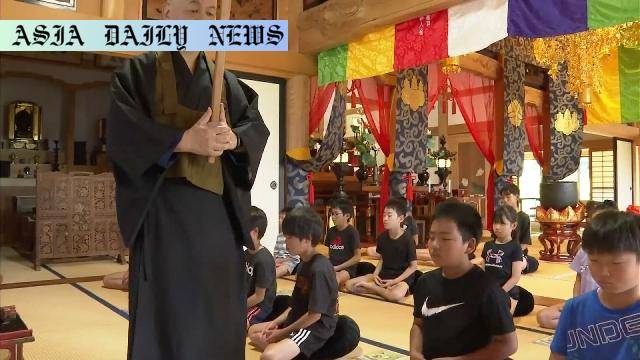Zen meditation unlocks tranquility for children at Jizoji temple with mindful practices like sutra chanting during summer vacation.
- Zen meditation session held for kids at Jizoji temple, Nagano.
- Sessions included silent meditation, sutra chanting, and script-copying.
- Children shared reflections on the calming and peaceful experience.
- Event aimed to cultivate mindfulness and focus among children.

The Significance of Zen Meditation for Children
Zen meditation, deeply rooted in Buddhist traditions, emphasizes mindfulness and inner peace. At Jizoji temple in Suwa City, Nagano, children on summer vacation got the rare opportunity to embrace these principles. Guided by the chief priest, Shinozaki Chigen, this annual event provided an avenue for approximately 15 young participants to disconnect from daily distractions and immerse themselves in practices of stillness and self-awareness. This initiative not only instilled a sense of calm but also underscored the relevance of mindfulness in child development.
During the event, the children were taught how to fold their legs and maintain the proper posture necessary for meditation. Though seemingly simple, these physical adjustments are instrumental in achieving mental clarity. A brief but potent 15-minute session of silent meditation followed, with the chief priest walking among the children, embodying serenity and focus. As time passed, participants reported both challenges, like numbness in the legs, and victories, such as moments of profound concentration.
Chanting Sutras: A Gateway to Tranquility
Following their meditation session, the children engaged in reciting and copying out Buddhist sutras. This activity emphasized the transformative power of repetition and focus, traditionally acclaimed for its ability to unify the mind and heart. Fourth and fifth graders remarked on the stark contrast between this tranquil environment and their typically noisy lives filled with televisions and other distractions. The exercise allowed them to appreciate the serenity offered by mindful activities and the deliberate act of writing sacred texts by hand.
The practice of sutra chanting is an age-old tradition within Zen Buddhism, designed to encourage focus and patience. For young participants, this was not merely a religious activity but an educational one, bridging cultural heritage with personal growth. The holistic experience illuminated the capacity of mindfulness practices to enrich both mental well-being and emotional maturity in children.
The Role of Temples in Instilling Mindfulness
Buddhist temples like Jizoji play an essential role in fostering communities and nurturing mindfulness. By organizing events such as this, religious spaces evolve into environments that extend beyond spirituality, harmonizing educational and personal development. As technology continues to dominate daily lives, particularly for younger generations, these initiatives are crucial as they provide an antidote to overstimulation.
Moreover, inspiring children to imbibe Zen philosophies early in life lays a solid foundation for inner peace and a focused mind. The blending of silent meditation and active participation in spiritual practices reflects a comprehensive approach to holistic development. It also highlights the relevance of ancient traditions in addressing modern-day issues such as stress, distraction, and lack of focus among children.
Finally, Jizoji temple’s commitment to providing these meaningful experiences showcases the value of spiritual spaces as centers of learning. In fostering a sense of inner calm and discipline, they contribute significantly to an individual’s lifelong journey toward mindfulness and peace.



Commentary
Fostering Focus and Peace Through Zen Meditation
The initiative taken by Jizoji temple to introduce children to Zen meditation is both heartfelt and timely. In today’s digitized age, where distractions are aplenty and peace of mind is increasingly scarce, such programs provide invaluable opportunities for young minds to learn the art of mindfulness. Silent meditation, in particular, serves as an antidote to the sensory overload common in the fast-paced schedules of modern children.
What stood out in this particular event was the combination of activities — from silent meditation to sutra chanting and script-copying. These diverse yet cohesive practices not only nurtured mindfulness but also promoted discipline, patience, and cultural awareness. Such experiences can leave a lasting impression on children, offering tools to cope with life’s stresses and teaching them how to reconnect with their inner selves amidst chaos.
Cultural Heritage Meets Modern-Day Relevance
It is fascinating to witness how the ancient practice of Zen Buddhism continues to find relevance in contemporary times. The temple’s effort to engage children in chanting sutras and learning core Buddhist practices bridges cultural heritage with personal development. Introducing children to these traditions not only instills a sense of reverence and focus but also equips them with practical methods to cultivate emotional clarity and resilience.
Furthermore, the children’s reflections — particularly how the practices contrasted with their noisy, digital lives — underline the growing need for mindfulness-based education in today’s world. Initiatives like these emphasize the importance of harmonizing tradition with modernity to create more balanced and centered individuals.
Lessons for Parents and Educators
For parents and educators, the event at Jizoji temple is a reminder of the importance of creating spaces for children to engage in activities that promote mindfulness. These need not always be religious or spiritual in nature but should emphasize focus, stillness, and self-awareness. Encouraging children to step away from their screens and engage in reflective practices can have profound effects on their mental and emotional well-being.
In conclusion, this annual event at Jizoji temple is a shining example of how simple practices like meditation and sutra chanting can yield transformative results, particularly for children. By creating opportunities for young minds to connect with peace and stillness, we lay the foundation for a more mindful and compassionate future generation.